
SDG 14 – Indicator 11.4.1 Sustainable practices targets
Universitas Sriwijaya is committed to promoting more sustainable commuting practices as part of its efforts to create an environmentally friendly campus and support the Sustainable Development Goals (SDG), particularly SDG 11: Sustainable Cities and Communities. A tangible demonstration of this commitment is the provision of public transportation services such as campus buses and shuttles, which facilitate mobility for students, faculty, and staff. These facilities not only reduce the reliance on private vehicles but also contribute to lowering carbon emissions on campus. Furthermore, to encourage the use of public transportation, UNSRI has initiated discussions about providing easier access to the Light Rail Transit (LRT) system for UNSRI students. The university is also developing a feeder shuttle bus system connecting the LRT to facilitate student accommodations.
In addition to public transportation, UNSRI has adopted electric vehicles as part of its sustainability initiatives. The campus has introduced 30 electric bicycles, available for use by faculty, staff, students, and the academic community for operational activities within the campus. These electric vehicles are environmentally friendly as they produce no direct emissions and represent a concrete step by UNSRI towards a cleaner energy transition. Through these initiatives, Universitas Sriwijaya demonstrates its commitment to fostering sustainable commuting, aligning closely with SDG 11 by creating a more inclusive, efficient, and environmentally sustainable campus transportation system.
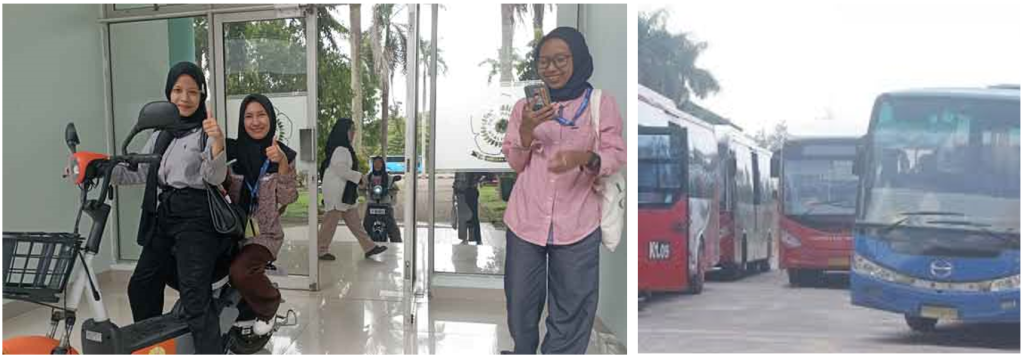
Links:
- Discussion Between UNSRI Leadership and the Sriwijaya Eco UNSRI Research Team
- Exploration of Special LRT Fare Programs for UNSRI Students
- Feeder Shuttle Bus Service for UNSRI Students
- Electric Bicycles as Facilities at Universitas Sriwijaya
- Shuttle Minibus for the Academic Community of FISIP Universitas Sriwijaya
SDG 11 – Indicator 11.4.2 Promote sustainable commuting
Universitas Sriwijaya actively promotes sustainable commuting practices to support its vision of an environmentally friendly campus in alignment with Sustainable Development Goal (SDG) 11: Sustainable Cities and Communities. The university provides public transportation options, including campus buses and shuttles, to facilitate mobility for students, faculty, and staff. These initiatives aim to reduce the reliance on private vehicles, thereby significantly cutting campus-wide carbon emissions. In addition to these efforts, UNSRI has embraced the use of electric vehicles as part of its sustainability agenda. The campus has made 30 electric bicycles available for operational activities, benefiting faculty, staff, students, and the wider academic community. These zero-emission bicycles exemplify UNSRI’s commitment to transitioning to cleaner energy sources while providing eco-friendly transportation options. Through these comprehensive measures, UNSRI demonstrates leadership in advancing sustainable urban transportation and fostering a greener, more inclusive academic environment.
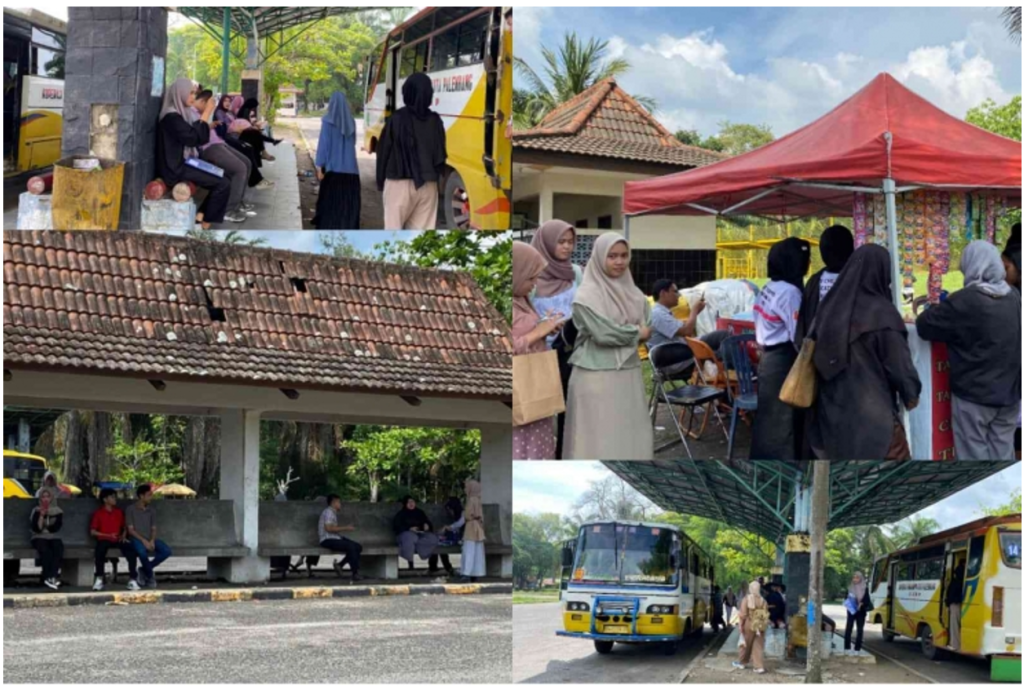
Links:
- Discussion Between UNSRI Leadership and the Sriwijaya Eco UNSRI Research Team
- Electric Bicycles as Facilities at Universitas Sriwijaya
- Shuttle Minibus for the Academic Community of FISIP Universitas Sriwijaya
SDG 11 – Indicator 11.4.3 Allow remote working
Universitas Sriwijaya actively supports remote working and distance learning for its lecturers, staff, students, and employees by utilizing advanced information systems and digital tools. To facilitate effective distance learning, UNSRI has developed an official E-learning website as its Learning Management System (LMS). Through this platform, lecturers and students can access all resources necessary for conducting and participating in classes, enabling seamless remote learning experiences.
In addition to the LMS, UNSRI has created its own video conferencing application, *USCAMZ*, designed to support virtual meetings and lectures. This innovation showcases UNSRI’s commitment to providing accessible and reliable tools for online collaboration and education. By leveraging these technologies, Universitas Sriwijaya ensures that teaching, administrative tasks, and communication can continue effectively, even outside the traditional office or classroom environment, reflecting the university’s dedication to adaptability and modernization in education and work practices.
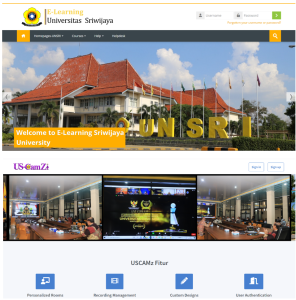
Links:
SDG 11 – Indicator 11.4.4 Affordable housing for employees
Universitas Sriwijaya (UNSRI) provides housing facilities for its lecturers and staff, offering a comfortable and supportive living environment that promotes both professional and personal well-being. These housing facilities are designed to create a sense of community among residents while fostering a balance between work and home life. Strategically located near the campus, UNSRI housing ensures easy access to the workplace, supporting productivity and convenience for employees. The housing facilities are equipped with essential amenities to meet the needs of the residents, including green spaces, recreational areas, and community spaces for gatherings. These facilities aim to enhance the quality of life for lecturers and staff, enabling them to focus on their professional responsibilities while enjoying a supportive living environment.
Link:
SDG 11 – Indicator 11.4.5 Affordable housing for employees
Universitas Sriwijaya is dedicated to supporting its students by providing affordable and accessible housing options, reflecting its commitment to Sustainable Development Goal (SDG) 11: Sustainable Cities and Communities. Through a variety of accommodation facilities, the university ensures that students from diverse backgrounds, including those from underprivileged areas, have access to safe, inclusive, and affordable housing close to campus. These initiatives not only alleviate the financial burden on students but also foster a supportive environment that encourages academic and personal growth. The available housing options include the Student Apartment, Student Dormitory (Rusunawa), and Local Government Dormitories.
The student apartment at Universitas Sriwijaya provides housing for students from various regions, offering an affordable rate of IDR 300,000 per month per student. The facility consists of two separate buildings, one designated for male students and the other for female students. Each building includes 150 bedrooms, with two students sharing a room. The apartments are equipped with facilities designed to ensure comfort and convenience for the residents. Create an introductory paragraph that mentions UNSRI’s commitment to providing affordable housing facilities for students in line with the SDG 11
The student dormitory, commonly referred to as Rusunawa, serves as a priority housing option for Bidikmisi scholarship recipients from across Indonesia. The dormitory offers highly subsidized accommodation at IDR 150,000 per month per student. Rooms in the older dormitory buildings are shared by two students, while the newer buildings accommodate up to four students per room. Both options come with essential amenities to support the students’ daily needs.
The local government dormitories consist of seven buildings, each named after a specific region: Lahat Dormitory (Female), Muara Enim Dormitory (Female), Muba Dormitory (Female), Musi Rawas Dormitory (Male), OKI Dormitory (Male), OKU Dormitory (Male), and Palembang Dormitory (Female). These dormitories are available at a rate of IDR 150,000 per month per student. Each room accommodates two students and is equipped with facilities to provide a comfortable living environment.

SDG 11 – Indicator 11.4.6 Pedestrian priority on campus
Universitas Sriwijaya (UNSRI), in alignment with Sustainable Development Goal (SDG) 11: Sustainable Cities and Communities, is committed to creating an inclusive and sustainable campus environment by prioritizing pedestrian accessibility. To support this vision, UNSRI has developed infrastructure such as sidewalks, guiding blocks, and ramps for people with disabilities, and walk parks while also ensuring safety, comfort, and accessibility for all members of its academic community. These facilities are strategically spread throughout the campus, allowing students, staff, and visitors to navigate the university easily and securely, regardless of their physical abilities. By promoting walking as an eco-friendly mode of transportation, UNSRI not only reduces its environmental impact but also fosters a culture of inclusivity and health-conscious living within its community.
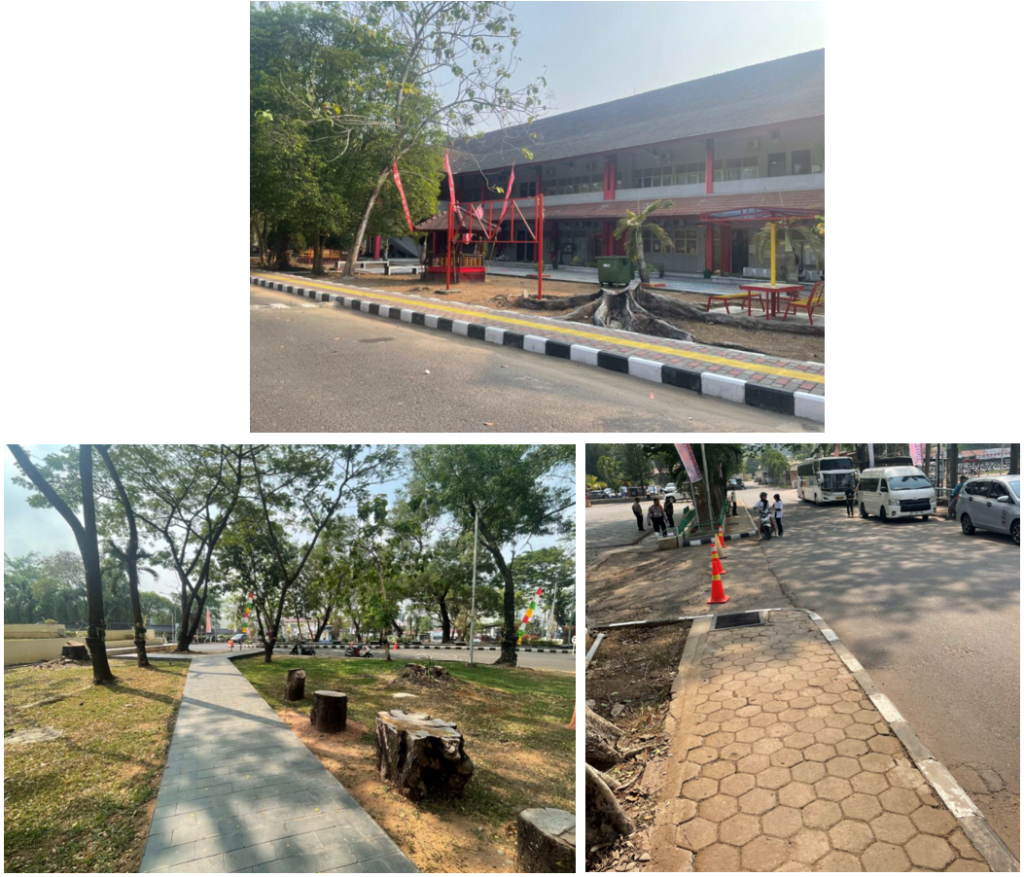
SDG 11 – Indicator 11.4.7 Local authority collaboration regarding planning and development
Universitas Sriwijaya (UNSRI) continues to prioritize regional development through collaborations with government institutions and ministries. Partnering with the Ministry of Public Works and Housing (PUPR), UNSRI has successfully developed student housing projects, including a four-story tower completed in 2019 and ongoing construction of additional flats to accommodate more students. These projects reflect UNSRI’s commitment to supporting student welfare while contributing to sustainable infrastructure development.
In collaboration with the Ministry of Villages, Development of Disadvantaged Regions, and Transmigration, UNSRI plays a key role in fostering village development, particularly through initiatives like establishing village-owned enterprises (Badan Usaha Milik Desa) and promoting tourist villages. These programs leverage various funding sources, including village funds, MSME budgets, and social assistance programs, to empower village leaders and communities to innovate and utilize their resources effectively. By focusing on local potential and cultural heritage, UNSRI aids in transforming villages into sustainable economic hubs.
UNSRI has also contributed significantly to rural planning through the development of comprehensive village data systems, utilized by government agencies for policymaking and targeted developmentUNSRI’s expertise in understanding and supporting villages makes it a vital partner in addressing rural challenges and maximizing village potential. These efforts align with the national Nawacita vision to eradicate poverty and hunger by prioritizing rural development and uplifting communities from the periphery.
Links:
- UNSRI’s Initiatives with Ministry of Public Works and Housing
- UNSRI’s Cooperation with Ministry of Villages, Development of Disadvantaged Regions, and Transmigration
SDG 11 – Indicator 11.4.8 Planning development
Universitas Sriwijaya (UNSRI) remains committed to implementing sustainable and environmentally friendly principles in the planning and development of its new infrastructure projects. This commitment aligns with the university’s vision of fostering a sustainable campus environment and supports the Sustainable Development Goals (SDG), particularly SDG 11: Sustainable Cities and Communities. Each new building at UNSRI is designed not only with functionality and aesthetics in mind but also with a focus on energy efficiency, the use of eco-friendly materials, and environmental stewardship.
A prime example of this commitment is the construction of the UNSRI Mosque. The mosque incorporates green building principles, utilizing natural ventilation to reduce reliance on air conditioning and optimizing natural lighting through strategically placed windows and skylights to minimize electricity usage. Additionally, the surrounding area features green open spaces and an efficient drainage system to manage rainwater sustainably. These efforts reflect UNSRI’s dedication to creating a campus that is not only modern but also environmentally conscious. By adopting sustainable and green building standards, UNSRI ensures that its infrastructure contributes to long-term benefits for the campus community while actively supporting environmental preservation.
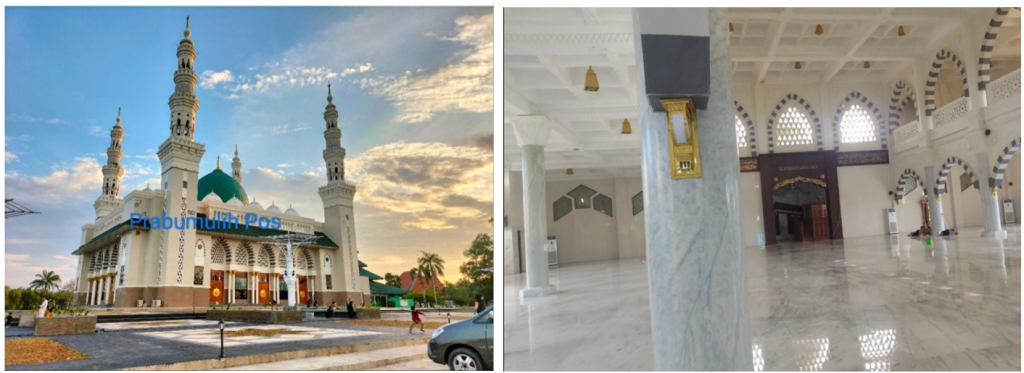
Link:
Indicator 11.4.9 Building on brownfield sites
Brownfield sites are previously used lands that are abandoned or underutilized, often due to contamination from past industrial or commercial activities. These sites pose challenges but also offer opportunities for restoration and sustainable reuse. Universitas Sriwijaya (UNSRI), in collaboration with CIFOR-ICRAF, is working on practical solutions to restore brownfield and degraded lands in South Sumatra. Their efforts focus on turning these areas into productive ecosystems through sustainable agriculture and ecological restoration. By addressing local environmental issues like land degradation, UNSRI not only improves the land’s usability but also supports communities that depend on these landscapes.
Universitas Sriwijaya (UNSRI), in collaboration with CIFOR-ICRAF, is actively working to restore degraded peatlands and mangroves in South Sumatra through innovative and sustainable approaches. This partnership, formalized under a renewed Memorandum of Understanding, includes initiatives like the *Sustainable Community-based Reforestation and Enterprises (SCORE)* project, which developed the successful “agrosilvofishery” model combining rice, trees, and fishponds. The collaboration also supports restoration pilot projects in Perigi Village and mangrove restoration efforts in Sungsang Village. Additionally, UNSRI and CIFOR-ICRAF engage in capacity-building programs, including the Young Scientist Incubator Programme and developing local curricula on sustainable peatland management for elementary schools. These efforts align with Indonesia’s national goal to restore 12 million hectares of degraded land by 2030 while addressing environmental challenges and improving community livelihoods.
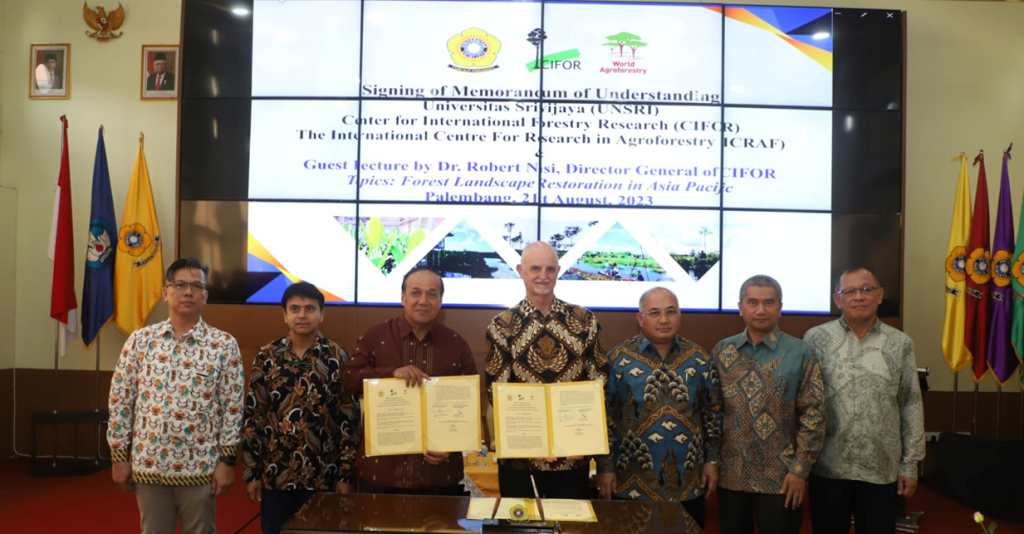
Link:
